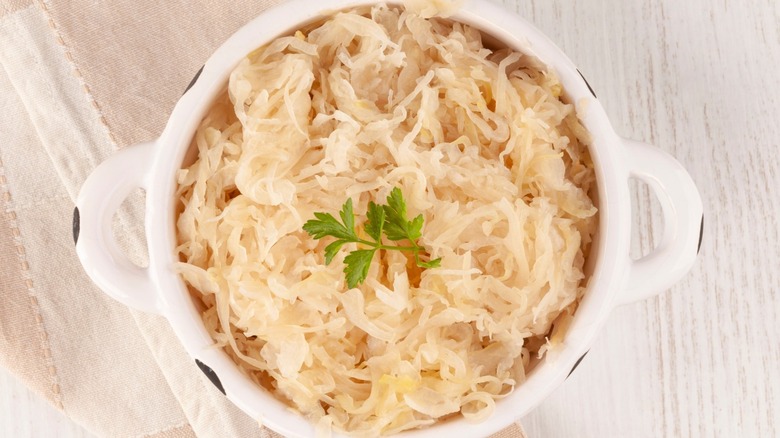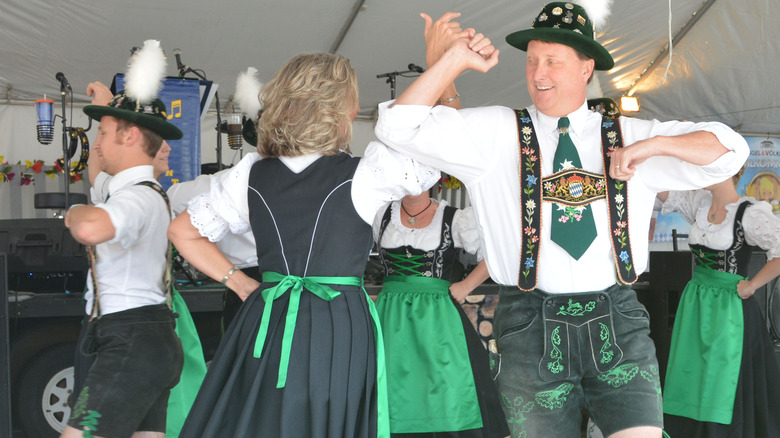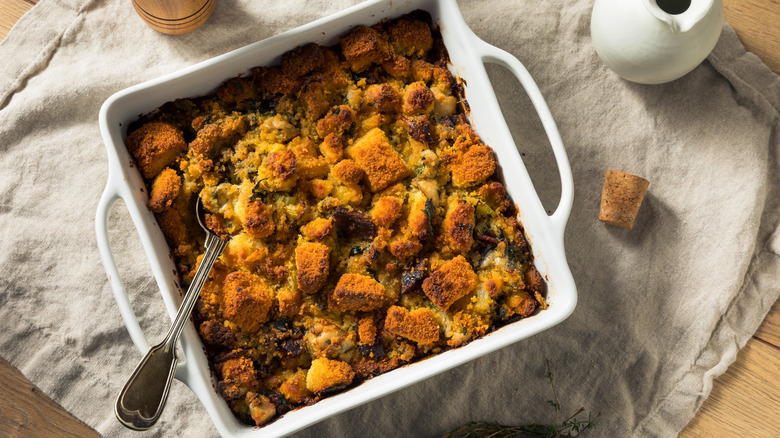The Reason Sauerkraut Is A Popular Thanksgiving Side In Maryland
Yay, Thanksgiving is almost here! Roast turkey, yummy mashed potatoes, crusty bread rolls, tangy cranberry sauce ... and sauerkraut? Who invited this, ahem, acquired taste to the party? Welcome to Bawlmer, hun! We do things a little differently in Charm City, and yes, that includes serving up sauerkraut on our Thanksgiving tables.
Umm, okay, to each their own, and regional cuisine is one of the things that makes our country great. Regional holiday variants are even more fun, and as we all know, different states have their own individual preferences for their favorite Thanksgiving sides. Maryland, as a whole, is partial to mac and cheese (via GrillCookBake) as befits its status as a below-the-Mason-Dixon line quasi-southern state. Baltimore, however, has always done its own thing, and if that civic individuality extends as far as serving their turkey with fermented cabbage — as Insider says is the custom — well, they're just paying homage to their roots.
Sauerkraut honors Baltimore's German settlers
According to the Library of Congress, German settlers were among the United States' first non-native inhabitants. While Pennsylvania was home to a large German community, German immigrants flocked to Maryland as well, and before the turn of the 19th century, they made up over 10% of the state's population. As the National Park Service relates, Germans were the largest immigrant group to settle in Baltimore throughout the 1800s, and they kept arriving up through the 20th century.
Needless to say, Germans contributed heavily to the city's foodways, and today, the area is home to several German restaurants, including Crossbar Biergarten, Das Bierhalle, and Döner Brös. (The last-named establishment is the purveyor of Baltimore's finest German/Turkish kebabs.) Sadly, the late great Haussner's, a recreation of which featured in an episode of "Mad Men," didn't quite make it to the new millennium (via Ghosts of Baltimore).
Nor has German cuisine been forgotten in private homes and church basements where they're still turning out specialties like sour beef and dumplings, wienerschnitzel, and schwarzwälder kirschtorte (via Baltimore Around the World). At the bare minimum, however, anyone can at least open a can of sauerkraut, so that is why this most iconic of German vegetable dishes makes its annual appearance on the Thanksgiving menu in the Old Line State, as Insider reveals. It could well be that Marylanders are just giving thanks to those Germans who helped make the state great.
Sauerkraut isn't the only unusual addition to Marylanders' Thanksgiving tables
Maryland Road Trips does a deep dive into Thanksgiving food traditions throughout the state. They note that the sauerkraut beloved by Baltimoreans was originally served with roast pork, and even today, pork may make an appearance alongside turkey on the table for a dual main course. Another entrée the publication mention's is the stuffed ham of St. Mary's County in the southern part of the state. The stuffing, in this case, refers not to the bread-based kind typically stuffed up a bird's behind but to a mixture of kale, cabbage, onions, and spices. Bread stuffing, too, has a place on Marylander's tables and is often made with oysters. Fried or raw oysters, crab cakes, and steamed crabs also play a part in some Maryland Thanksgiving feasts, turning that turkey dinner into a surf-and-turf. (Baltimore's Costas Inn urges its patrons to place their crab orders early as they'll be closed on the holiday.)
Other Maryland Thanksgiving favorites include cornbread — particularly the Eastern Shore's "wet" version that resembles a kind of spoon bread — along with sweet potatoes in the form of either casseroles or pie. According to food historian Michael Twitty, sweet potatoes are particularly important within Maryland's African-American community, and sweet potato pie frequently takes the place of pumpkin as many Marylanders' must-have Thanksgiving dessert. Yet another dessert pie, primarily known on the Eastern Shore, is made from sweetened white potatoes flavored with lemon and nutmeg.


